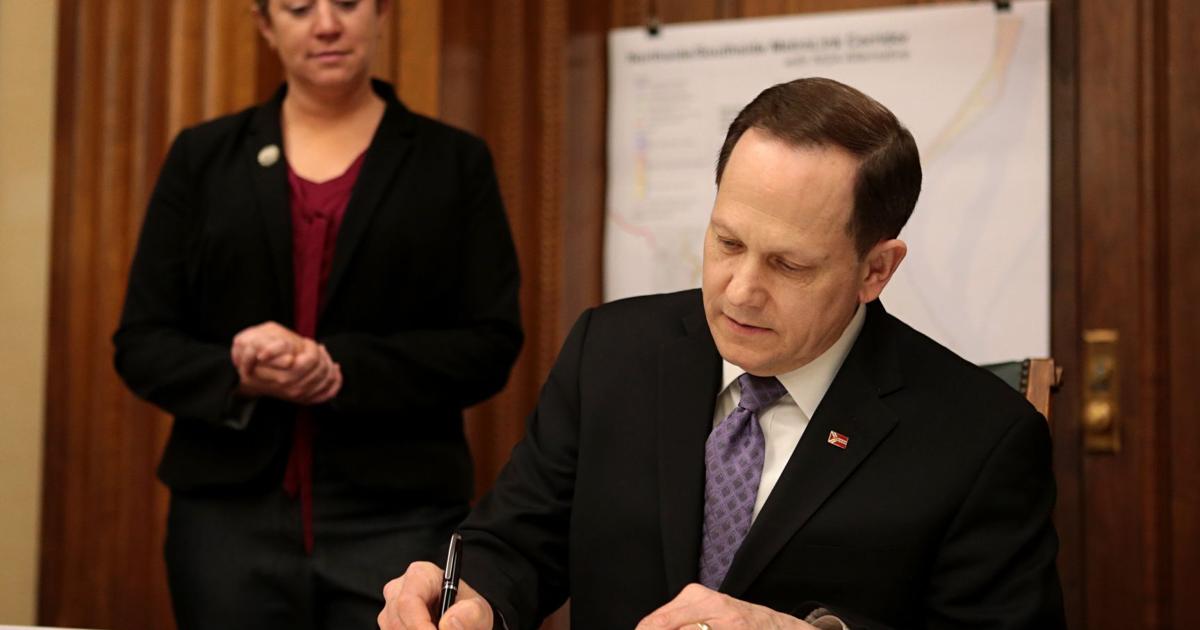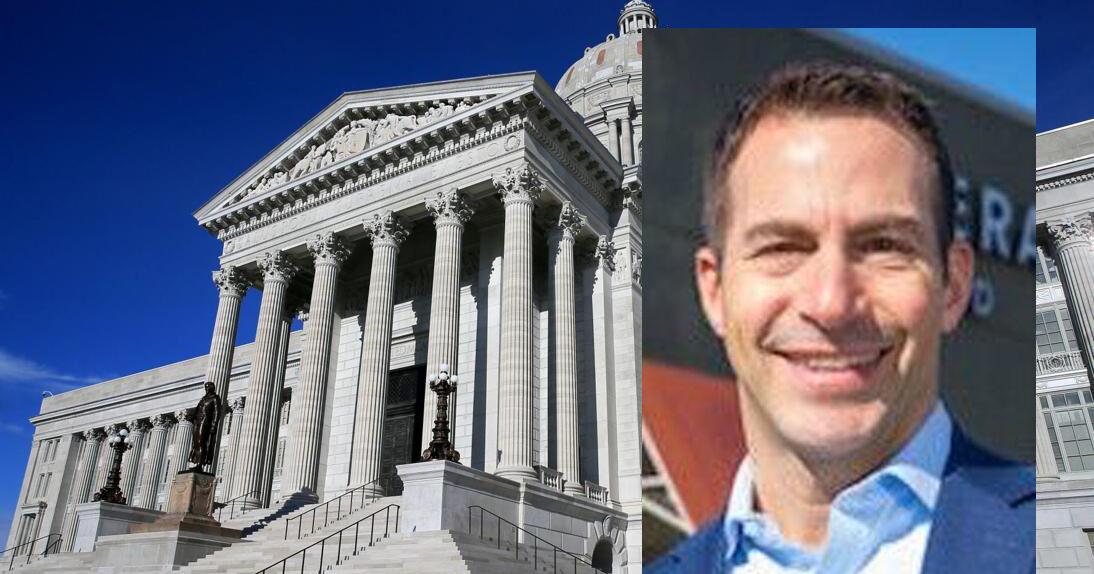For two years, Missouri Gov. Mike Parson has pushed unsuccessfully to allow government agencies to withhold more information from the public and charge more for any records that are turned over.
And according to a 2021 memo obtained by The Independent, one of the architects of Parson’s plan to weaken government transparency laws was Andrew Bailey.
At the time, Bailey was serving as the governor’s general counsel. In January, he was sworn in as Missouri’s attorney general, the office in charge of enforcing the Sunshine Law and making sure government agencies are complying with its provisions on open records and public meetings.
Since he stepped on the public stage for the first time late last year as Parson’s pick to replace Eric Schmitt as attorney general, Bailey has faced criticism from transparency advocates — first over the governor’s office slow-walking release of documents from his time as general counsel, then for a massive backlog of public records requests within the attorney general’s office.
People are also reading…
The 2021 memo, which Bailey brought with him when he moved into the attorney general’s office, has intensified that criticism.
David Roland, director of litigation for the libertarian nonprofit Freedom Center of Missouri, can’t say with certainty that the memo represents Bailey’s true feelings, he said, as opposed to simply putting the governor’s ideas in writing.
“But the very clear consequence of this memo is that someone — whether it’s the governor, whether it’s the attorney general or whether it’s people that are very influential officials — is really intent on ratcheting down the level of transparency in Missouri government,” he said.
Between the memo and his actions as attorney general, it is clear that Bailey “is not a Sunshine Law devotee,” said Jean Maneke, an attorney for the Missouri Press Association. “And he’s certainly not dedicated to the public’s right to know.”
Madeline Sieren, spokesperson for the attorney general’s office, said that in 2021, Bailey was instructed as Parson’s general counsel to “collaborate with other stakeholders to propose legislative ideas that would modernize the Sunshine Law.”
Asked about whether Bailey believes the legislature should implement the proposed changes outlined in the memo, Sieren would only say that the attorney general “is committed to providing transparency for all Missourians.”
‘More restrictive direction’
In June 2021, the Missouri Supreme Court ruled that Parson’s office improperly redacted public records, charged exorbitant fees and knowingly and purposely violated the state’s open records law.
Months later, The Independent reported on a presentation made to Parson’s cabinet about proposed changes to the Sunshine Law that the governor’s office intended to make a priority heading into the 2022 legislative session.
But the outline of Parson’s plan actually came together months before the Supreme Court verdict.
Bailey and Parson’s policy director, Kayla Hahn, laid out in a May 2021 memo a wide array of changes aimed at limiting access to public records. Included was a proposal that would reverse the Supreme Court’s decision by allowing government agencies to charge fees for the time attorneys spend reviewing records requested by the public.
The memo contained myriad other ideas that transparency advocates say would essentially gut the Sunshine Law by closing records and meetings to public scrutiny.
“Government is supposed to be open to the public,” Maneke said. “The public has a right and a need to know what is happening with their tax money and in their name. If this memo is to be believed, the attorney general doesn’t agree with that.”
Sieren said in an email to The Independent that one of the goals of the 2021 memo was to draft a plan to align the Sunshine Law with the guidelines of the federal Freedom of Information Act.
What that really means, Roland said, is making the Missouri Sunshine Law much weaker.
“The Sunshine Law, as currently written in Missouri, provides a greater degree of transparency than is required under the federal Freedom of Information Act,” he said. “The memo makes a great deal about trying to harmonize the two, and it only ever wants to harmonize in the more restrictive direction.”
The Sunshine Law is one of the very few areas of the law, Roland said, “where a citizen is supposed to “have a very definitive thumb on the scale in their own favor.”
“And that’s not an accident,” he said. “It’s because Missourians, when we adopted the Sunshine Law, recognized the importance of government transparency. We wanted to make that abundantly clear for the courts. So that when these issues were disputed in the courts, the courts would understand.”
Bailey’s memo seeks to change that, Roland said, by instructing courts to take a less expansive view of the Sunshine Law.
Many of the provisions in Bailey’s memo found their way into legislation filed during the 2022 and 2023 sessions. None of the bills picked up much momentum, and only one cleared a Senate committee this year with most of the more controversial proposals removed.
Public records backlog
Last month, The Independent reported on a massive backlog of records requests in the attorney general’s office.
As of mid-June, the attorney general’s office was working on 374 pending records requests filed by the public. Of those requests, 150 were filed since Bailey took over the office in January and 224 were inherited from his predecessor Schmitt, who was elected to the U.S. Senate last year.
Last week, the attorney general’s office said the number of pending requests has grown to 389.
The result: The public often has to wait more than a year for requests to be completed and taxpayer-funded records to be turned over.
For example, The Independent filed a request in February asking for documents about the attorney general’s investigation of a transgender care center in St. Louis. The attorney general’s office sent notice last week that the records won’t be made available until Feb. 5, 2024.
Sieren said the attorney general is “adding two more full-time positions to process Sunshine Law requests for our office, in addition to the two full-time employees our office currently has.”
Missouri Independent is part of States Newsroom, a network of news bureaus supported by grants and a coalition of donors as a 501c(3) public charity. Missouri Independent maintains editorial independence. Contact Editor Jason Hancock for questions: info@missouriindependent.com. Follow Missouri Independent on Facebook and Twitter.






























/cdn.vox-cdn.com/uploads/chorus_asset/file/25782636/247422_ChatGPT_anniversary_CVirginia.jpg)
/cdn.vox-cdn.com/uploads/chorus_asset/file/25789444/1258459915.jpg)

/cdn.vox-cdn.com/uploads/chorus_asset/file/25546252/STK169_Mark_Zuckerburg_CVIRGINIA_D.jpg)


/cdn.vox-cdn.com/uploads/chorus_asset/file/23951353/STK043_VRG_Illo_N_Barclay_3_Meta.jpg)